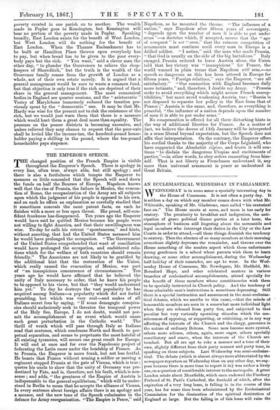THE EMPEROR'S SPEECH.
T1changed position of the French Empire is visible hroughout the Emperor's Speech. There is apology in every line, often true, always able, but still apology ; and there is also a fretfulness which tempts the Emperor to menaces so little concealed that the Speech will send down the funds on half the Bourses of Europe. Napoleon knows well that the rise of Prussia, the failure in Mexico, the evacua- tion of Rome, the reorganization of the Army are all subjects upon which the judgment of his people is opposed to his own, and on each he offers an explanation so carefully studied that it sometimes conceals the most patent facts, on each he finishes with a more or less open threat. His proud, self-con- fident frankness has disappeared. Ten years ago the Emperor would have said he quitted Mexico because his people were not willing to fight America, and that their unwillingness was wise. To-day he calls his retreat "spontaneous," and hints, without asserting, that had the United States menaced him he would have prolonged the occupation. " The Government of the United States comprehended that want of conciliation would have prolonged the occupation, and embittered rela- tions which for the welfare of both countries should remain friendly." The Americans are not likely to be gratified by the additional hint that the restoration of the Union, which really caused the evacuation of Mexico, was part of "an inauspicious concurrence of circumstances." Ten years ago he would have affirmed that he believed the unity of Italy necessary to order, that he knew his people to be opposed to his views, but that "they would understand him yet." To day he destroys the vast popularity he has acquired among Italians—a popularity which did not forbid grumbling, but which was very real—and makes of all Italians secret foes by saying, " If some demagogic conspira- cies should audaciously seek to threaten the temporal power of the Holy See, Europe, I do not doubt, would not per- mit the accomplishment of an event which would cause such great perturbation in the Catholic world." The thrill of wrath which will pass through Italy as Italians read that sentence, which condemns North and South to per- petual separation, and seems to perpetuate the most hateful of all existing tyrannies, will secure one great result for Europe. It will end at once and for ever the Napoleonic project of federating the Latin races under the headship of France. As to Prussia, the Emperor is more frank, but not less fretful. He boasts that France without arming a soldier or moving a regiment stopped Prussia at the gate of Vienna, which is true ; quotes his uncle to show that the unity of Germany was pre- destined by Fate, and is, therefore, not his fault, which is non- sense ; and adds, " the greatness of the Empire of Austria is indispensable to the general equilibrium," which will be under- stood in Berlin to mean that he accepts the alliance of Vienna. In every sentence about foreign affairs there is an apology and a menace, and the new tone of the Speech culminates in the defence for Army reorganization. "The Empire is Peace," said Napoleon, as he mounted the throne. " The influence of a nation," says Napoleon after fifteen years of sovereignty, " depends upon the number of men it is able to put under arms "—a doctrine which, if accepted, means that the " age of conquest " is not " over," that the ruinous competition of armaments must continue until every man in Europe is a drilled soldier. " I notice," said the man who made Prussia, " that God is usually on the side of the big battalions." Italy enraged, Prussia ordered to leave Austria alone, the Union told that her victory was " inauspicious " for France, the world warned in plain terms that Napoleon will arm,—no speech so dangerous as this has been uttered in Europe for fifteen years. " Foreign relations," says the Emperor, " are all satisfactory." " Our connection with England becomes daily more intimate," and, therefore, I double my Army. "Prussia seeks to avoid everything which might arouse French suscep- tibilities," but must avoid weakening Austria, too; "Russia is not disposed to separate her policy in the East from that of France ;" Austria is the same, and, therefore, as everything is peaceful, "the influence of a nation depends upon the number of men it is able to put under arms."
No compensation is offered for all these disturbing hints in the way of additional liberties for France. As a matter of fact, we believe the decree of 11th January will be interpreted in a sense liberal beyond expectation, but the Speech does not affix that interpretation. On the contrary, the Emperor offers his cordial thanks to the majority of the Corps Legislatif, who have supported the Absolutist regime, and trusts it will con- tinue " to disdain the dangerous Utopias and excitements of parties,"—in other words, to obey orders emanating from him- self. That is not liberty as Frenchmen understand it, any more than universal armament is peace as understood in Great Britain.






























 Previous page
Previous page